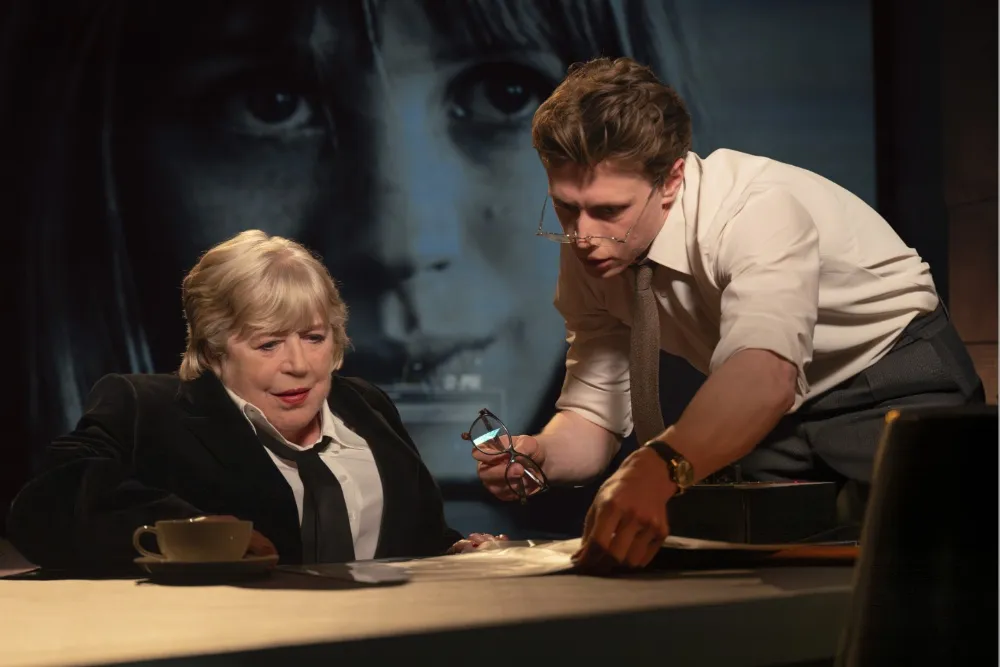An unorthodox biographical portrait of Marianne Faithfull, Broken English began as a collaboration between the co-directors and their subject, but it turned into a posthumous memorial project when Faithfull died unexpectedly in January this year. Straddling the border between visual artists and film-makers, Jane Pollard and Iain Forsyth previously directed the playfully meta-fictional Nick Cave documentary 20,000 Days on Earth (2014) and the charmingly quirky cinematic concept album The Extraordinary Miss Flower (2024). Borrowing stylistic elements from both, particularly the latter with its heavy emphasis on vintage recording studio technology, Broken English could almost be seen as a third chapter in a loose trilogy.
Pollard and Forsyth approach Faithfull’s legacy from an elliptical angle, combining new first-hand interviews with wide-ranging archive material, backstage group discussions and fictionalised dramatic vignettes. These are all interwoven with musical performances from the sandpaper-voiced rock icon herself, plus a starry supporting cast of friends and acolytes including Cave, Warren Ellis, Courtney Love, Suki Waterhouse, Thurston Moore and others.
Judged by the standards of conventional rock documentaries, Broken English feels self-indulgent and disjointed in places. But viewed on its own terms, as a stand-alone audiovisual artwork that uses Faithfull’s life and legacy as a freewheeling canvas, it is an admirably ambitious and sporadically fascinating experiment. Following its Venice world premiere this week, this multi-layered memory palace of words and music should generate plenty of interest based on its late star’s enduring legend status.
Filming at the end of a long struggle with emphysema, pneumonia and Covid, Faithfull spends much of Broken English hooked up to an oxygen tank. Even so, she proves reliably regal and sparky on screen, dropping F-bombs and C-bombs as she watches her past life flash before her in vintage footage and newspaper clippings. A quick-witted but fawning interviewer, McKay is careful not to over-stress the singer’s career-making period as Mick Jagger’s girlfriend in the Swinging Sixties. Even so, she speaks fondly and freely of Jagger, only becoming guarded when talk turns to the drugs bust at Keith Richards’ Redlands house in 1967, an epochal event which saddled her image with some notoriously sleazy and sexist tabloid rumours. Fake news is not a modern invention.
Broken English pinballs through Faithfull’s life story, touching on her bohemian upbringing, her Rolling Stones connections, her suicide attempt in 1969, her long friendship with Allen Ginsberg, her descent into heroin addiction, her numerous comebacks, her most celebrated songs, her stage work, her rich collaborations with studio producer Hal Wilner, and more. But her film career is oddly overlooked, essentially squeezed into a short montage, while there is almost zero detail on her post-Jagger private life and three marriages.
Framing all this factual material is a tricksy theatrical device, with nods to Beckett and Brecht, in which Tilda Swinton and George McKay play employees of the vaguely Orwellian “Ministry of Not Forgetting”, whose mission is to “recalibrate Marianne’s legacy” so that her most important work gets due credit. This apparently means talking up her trailblazing feminist credentials and underrated artistic achievements while downplaying the more salacious, reductive mythology around her life. A perfectly noble ambition, even if the method chosen feels laboured and convoluted, not to mention condescending to viewers who may already be well aware of Faithfull’s talents. Numerous reverential biographies and documentaries have already “saved” her reputation from the rock’s official male-dominated narrative.
Viewer tolerance levels will vary for all the post-modern conceptual padding in Broken English, but it is debatable whether these stylistic gimmicks actually reveal anything deeper about Faithfull’s legacy, or simply get in the way. Similarly clunky and superfluous is an earnest round-table debate about the Redlands bust, featuring a gallery of women artists but not Faithfull herself, which mostly results in glib soundbites: “there’s nothing more frightening than female desire.” Meanwhile, important figures with first-hand connections to the star, including her first husband John Dunbar, are relegated to pointlessly fleeting cameos.
In fairness, the directing duo’s informal, deconstructed approach does prove rewarding in places. A montage of clips in which male interviewers bombard Faithfull with intrusive, creepy or bluntly misogynistic questions packs a powerful collective punch. Scenes of the 78-year-old boho-rock queen engaging in wistful dialogue with her luminously beautiful, idealistic, innocent younger self are unavoidably moving. Likewise the poignant moment where she shares scrapbooks of her early celebrity exploits, compiled by her late father, which she only discovered in later life.
A mix of classic footage and new recordings, the musical interludes in Broken English are scattered throughout the film almost randomly, with scant explanatory context. Quality levels vary, but there are many fine numbers, including French actor-singer Jehnny Beth putting a punky New Wave spin on the spiky “Why’d Ya Do It?”, and Faithfull herself revisiting her autumnal 2018 ballad “Misunderstanding”, backed by Cave and Ellis, their shared humour and warm chemistry joyful to behold. In addition, an ever-present ambient-rock background score by Rob Ellis and Adrian Utley, who also appear on screen, reinforce the sense that this is a more an audiovisual album than a standard music documentary. Ultimately, much like Faithfull herself, Broken English is unashamedly pretentious and self-aggrandising at times, but it comes with grand intentions and rich cultural treasures that are hard to dislike.
Directors: Jane Pollard, Iain Forsyth
Screenwriters: Jane Pollard, Iain Forsyth, Ian Martin
Cast: Marianne Faithfull, Tilda Swinton, George McKay, Suki Waterhouse, Beth Orton, Courtney Love, Jehnny Beth, Nick Cave, Warren Ellis
Cinematography: Daniel Landin BSC, Erik Alexander Wilson, Derrick Peters
Editing: Luke Clayton Thompson
Production designer: Alison Dominitz
Music: Rob Ellis, Adrian Utley
Producers: Beath Earl, Jane Pollard, Iain Forsyth
Production companies: Rustic Canyon Pictures (UK), Phantoscopic (UK)
World sales: Cinetic (US), Global Constellation (UK)
Venue: Venice Film Festival (out of competition)
In English
96 minutes






